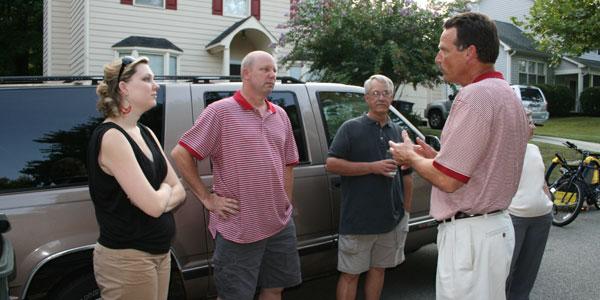Greensboro residents lined up at the polls recently to elect the mayor and city council members for the city. The voting community elected a new mayor, foreshadowing possible changes for the city. Mayor-Elect Robbie Perkins talked to The Guilfordian about his new position and plans for his time in office.
The Guilfordian: What changes do you plan to make first?
Robbie Perkins: I don’t plan to make any changes, because I’m just the mayor. The majority city council needs to decide if anything actually gets done. The biggest thing I can do is lead the council in a direction that I think is positive for Greensboro. What I’ve been doing since the election was to meet with all the council members and try to build some kind of consensus as to what we think needs to be done in our city. I think the first thing everyone is concerned about is jobs and economic development, the second thing is public safety, the third is maintaining our infrastructure.
G: What is your plan for facilitating more cooperation and communication with the council?
RP: I think we’re doing that. I think that it’s incumbent on the mayor to talk to all the council members instead of just a small group and we’re going to do that. We’re working hard to try to make sure that everybody is in the loop and involved in decisions.
G: How do you plan to create jobs and economic growth?
RP: Number one, we have to create a positive business environment inside of Greensboro and have the city believe we can prosper. I think you do that by talking positively about your community and working together to show them that the city and county government can work together for the common good. Then, I think the next thing that you have to do is go out and promote your community to the region, and those outside the region, to attract companies to relocate in our community. One of the things that I have done over the years is work hard on establishing relationships with other regional leaders that I think will pay dividends when I take office as mayor.
G: Now that you’re elected, what are your thoughts on the White Street Landfill?
RP: The White Street Landfill is not going to reopen. In terms of our solid waste management strategy, I think we have to look at all the options. I believe there will be some options available that will involve regional disposal facilities that are emerging now that should have been looked at before and for one reason or another were not; Randolph County being one, Rockingham County being two and a shared facility for the triad being a third option that may be a longer term solution, but something that we all want to work on.
G: What is your immediate and long term plan for Greensboro’s waste issues?
RP: The immediate plan is that we’ve extended the contract (with Republic Waste) for another 6 months through June 30 and now we’re going to a work on a solution that’s will save us some money and that doesn’t entail reopening White Street.
G: With a number of Greensboro businesses closing in the past year, how do you plan to reverse this trend?
RP: This is a tough recession; this is not something that any of us have ever been through. It’s an unprecedented situation in terms of unemployment and people losing jobs (and) … something that we’re not going to come out of quickly or easily. The regulatory environment is something that we need to try to pare down. We don’t need to have any unnecessary regulations on the books that are going to impair businesses, but at the same time you have to protect the city that you’re living in in terms of over development when things come back, so we need to have responsible planning and we need to make sure what does get built in our city is built in an attractive manner. We don’t want to build a bunch of junk; we want to build responsibly.
G: What is your opinion on the Occupy movement, specifically in Greensboro?
RP: I think that the Occupy movement in Greensboro went pretty peacefully. They set up camp in downtown and I think the city worked with them to grant them at a reduced cost a location to camp. I think our police did a good job of cooperating with them so that there wasn’t any violence. I don’t think we had an arrest in Greensboro when they were here. It was something that certainly they have the right to do and that’s why the rights that we have in our country are so special and so valuable; people can do that without being persecuted or thrown in jail.
G: Greensboro has five four-year universities. How will you use your position as mayor to help keep a larger number of those students in Greensboro and working after they’ve graduated?
RP: The success for the universities is also the city’s success. They are a stabilizing portion of our economy because students go to school whether the economy is good or bad, and sometimes they stay in school longer when the economy is bad. We need to make sure that we help the colleges and universities with their long-term growth plans and we don’t inhibit them and we’re working together as opposed to trying to stop what they’re interested in doing.
G: Do you have any plans to reach out to the LGBT community in Greensboro?
RP: I have reached out pretty significantly to that community and have attended their functions and events and welcomed the influence about the various legislative proposals that are coming down from Raleigh and Washington. I have kept my finger to that pulse very carefully.
G: (Question submitted by Guilford student) What is your opinion on the current referendum in the primaries to amend NC’s constitution to ban same-sex marriage?

